- Home
- Eoin Colfer
Novel - Half Moon Investigations
Novel - Half Moon Investigations Read online
Text copyright © 2006 by Eoin Colfer All rights reserved. No part of this book may be reproduced or transmitted in any form or by any means, electronic or mechanical, including photocopying, recording, or by any information storage and retrieval system, without written permission from the publisher. For information address
Hyperion Books for Children, 114 Fifth Avenue,
New York, New York 10011-5690.
Printed in the United States of America
First American edition
10 9 8 7 6 5 4 3 2 1
Library of Congress Cataloging-in-Publication Data on file.
ISBN 0-7868-4957-6
Reinforced binding
Love Me Tender
Words and Music by Elvis Presley and Vera Matson
Copyright © 1956 by Elvis Presley Music, Inc.
Copyright Renewed and Assigned to Elvis Presley Music
All Rights Administered by Cherry River Music Co. and Chrysalis Songs
International Copyright Secured
All Rights Reserved
To All the Girls I’ve Loved Before
Lyric by Hal David
Music by Albert Hammond
Copyright © 1975 (Renewed 2003), 1984 EMI APRIL MUSIC INC.
and CASA DAVID
All Rights Reserved
International Copyright Secured
Used by Permission
Visit www.hyperionbooksforchildren.com
Table of Contents
Other Books By This Author
1. The First Rule Of Investigation
2. I Get A Stick Figure
3. I'm On The Case
4. Making An Impression--on My Forehead
5. Dr. Brendan's Bedside Manner
6. In The Public Eye--and Not In A Nice Way
7. Jailbreak
8. At Home With The Sharkeys
9. Proof, Or Results?
10. The Young Students
11. The Power Of Magnetism
12. The Promise
13. A Giant's Trail
14. Larry And Adam
15. I See Things As They Really Are--finally
Epilogue
Eoin Colfer
Artemis Fowl: Read The Entire Series
Artemis Fowl Book 1
Artemis Fowl Book 2: The Arctic Incident
Artemis Fowl Book 3: Eternity Code
Artemis Fowl Book 4: Opal Deception
Artemis Fowl Book 5: Lost Colony
Artemis Fowl Book 6: Time Paradox
Artemis Fowl Book 7: Atlantis Complex
To Liam and John:
The Thursday-Night Think Tank
OTHER BOOKS BY EOIN COLFER
Artemis Fowl
Artemis Fowl: The Arctic Incident
Artemis Fowl: The Eternity Code
Artemis Fowl: The Opal Deception
The Artemis Fowl Files
The Supernaturalist
The Wish List
Eoin Colfer’s Legend of Spud Murphy
Eoin Colfer’s Legend of Captain Crow’s Teeth
THE FIRST RULE OF
INVESTIGATION
MY NAME IS MOON. Fletcher Moon. And I’m a private detective. In my twelve years on this spinning ball we call Earth, I’ve seen a lot of things normal people never see. I’ve seen lunch boxes stripped of everything except fruit. I’ve seen counterfeit homework networks that operated in five counties, and I’ve seen truckloads of candy taken from babies.
I thought I’d seen it all. I had paid so many visits to the gutter looking for lost valentines, that I thought nothing could shock me. After all, when you’ve come face-to-face with the dark side of the school yard, life doesn’t hold many surprises.
Or so I believed. I was wrong. Very wrong.
One month ago a case came knocking on my door that made me consider getting out of the detective business for good. I’d just turned twelve, and already I had a dozen successful investigations under my belt. Business was good, but I was ready to start solving actual crimes. No more kid stuff. I wanted real cases that paid real money, not just whatever a kid happened to have in his pocket at the time.
It all went wrong the day I decided to break Bob Bernstein’s first rule of investigation: Be invisible. Put the pieces of the puzzle together, but never become one of those pieces yourself.
Herod Sharkey made me forget that rule.
As every private investigator knows, Bob Bernstein is the legendary FBI agent turned PI, who founded the Bernstein Academy in Washington, D.C., to train aspiring investigators properly. He also wrote the Bernstein manual, which every student needs to know by heart if they are to have any hope of qualifying. I knew the manual from cover to cover, and I had qualified at the top of my online class, though I’d had to use my dad’s birth certificate to do it. Luckily we both share the same name.
September twenty-seventh. That day is as clear to me as a high-resolution photograph. The end of our first month back in school after the summer holidays. Unfortunately the summer didn’t know it was over and was pouring on the sunshine. The heat came off the tar concrete in sheets, wrapping itself around the students of Saint Jerome’s Elementary and Middle School.
I arrived at the gates around the usual time, 8:50. I like to be ten minutes early wherever I’m going. Gives me time to get my finger on whatever pulse is beating. Private detectives need to be in touch with their environment. The Bernstein manual says that A detective never knows where his next case is coming from. For all he knows, it could be a puzzle that he has already solved, if he’s kept his eyes open. So I keep my eyes wide open. I can tell you which kids have wart acid on their fingers. I know who’s passing loveydovey notes around in the yard, and even which teachers stop off at the Burger Mac on their way to school.
But nobody can possibly see everything. Not even the legendary detective Bob Bernstein. That’s why I needed my informants. Doobie Doyle was the best one I had. An eight-year-old snot-nosed snitch with sharp eyes and a big mouth. Doobie would sell out his own mother for a sweaty handful of jelly beans. Unfortunately, when I say Doobie was snotnosed, it’s not just a turn of phrase. Doobie never went anywhere without a couple of green yo-yo’s hanging from his nostrils, which he then snorted back up so hard that they wrapped around his brain. Actually, it was the perfect disguise. It was all people noticed about him. If Doobie ever wiped his nose, his own mother wouldn’t be able to pick him out of a lineup.
On that morning, the twenty-seventh, he was at the gates waiting for me. I was surprised. Usually I had to track him down. This must be important.
“Morning, Fletcher,” he said, trotting along beside me.
I didn’t look down. A close-up view of Doobie was not how you wanted to start your day.
“What have you got for me?” I asked casually.
“Did you see Captain Laserbeam last night? There was a mud monster.”
Doobie was a good snitch, but he distracted easily.
“Let’s talk about cartoons later, Doobie. Do you have some information?”
“Yep. Good stuff. But I want to see the badge.”
I sighed. Doobie always wanted to see the badge. It was shiny, and he was eight.
“Okay. One peek, then spill the beans.”
I reached into my pants pocket and pulled out a small leather wallet. I flipped it in front of Doobie’s face. Inside was a laminated card and a silver-plated detective’s badge. Sunlight winked along the badge’s ridges, and for a long moment I was mesmerized by it. Even after six months, I sometimes found it hard to believe that it was finally mine.
“Wow,” said Doobie, with real reverence, which gave way quickly to doubt. “You sure this is real?”
I tapped the lami
nated card. “It’s all right there, Doobie. Fletcher Moon. Graduate of the Bob Bernstein Private Detective Academy.”
“Can I have it?” asked Doobie, just like he did every time he saw the badge.
“No,” I replied, slipping the wallet back into my pocket. “This took me two years to earn. Even if you had it, it wouldn’t be yours.”
Doobie frowned. This kind of thinking was a bit advanced for someone who hadn’t yet worked out the mechanics of a tissue.
“So, what have you got for me, Doobie? Something juicy, I hope?”
“I dunno what I’ve got,” he said. “I only came looking ’cause everyone knows I’m your secret snitch and they asked me to find you.”
I stopped. “Who asked you?”
“Herod Sharkey,” replied Doobie. “I don’t know who the other one is, but he’s big, really big.”
Herod Sharkey. According to school yard rules, that name shouldn’t have bothered me in the least. After all, I was in seventh grade and Herod was merely a fifth-grader. But the Sharkey family wasn’t one for rules. In fact, if there was an unbroken rule somewhere, the Sharkeys would drive several hundred miles out of their way just to break it.
Herod was one of the school bad kids. The teachers have a name for people like Herod. They call him one of the “usual suspects.” Whenever anything went missing, he was routinely summoned to the principal’s office for questioning. Nine out of ten times, Herod had the missing thing in his pocket. The other time, he had probably buried it in the sports field. It wouldn’t be long before the police began to call the school looking for him.
So why would Herod Sharkey be looking for me? I didn’t own anything valuable. Except my detective’s badge. My hand went instinctively to my pocket, but the wallet was still there. I decided to check it every thirty seconds or so, just to be on the safe side.
I dropped my bag off at my locker, then followed Doobie around the side of the school, past the oil tank that had been painted to look like Thomas the Tank Engine, to the basketball court, where all the major student business was conducted. If you needed to hire someone to tell someone that a third person liked them, then this was the place to find that someone. The basketball court was also the agreed location for school fights. I could see from the ragged ring of kids that someone had booked an early slot to settle a disagreement.
“Where’s Herod?” I asked Doobie, though I already knew. Herod was a Sharkey, so there was only one place that he was likely to be.
“He’s fighting. They’re headlocked.”
I nodded. Headlocked was better than pinwheeling. A person could get himself injured getting involved in a Pinwheel.
There are several kinds of school fights. The three most popular kinds are the Pinwheel, the Hold-Me-Back, and the Headlock. In the Pinwheel, the two fighters run at each other, eyes closed and arms spinning. The object was to catch your opponent with a lucky shot, but more often than not the enemies missed each other by yards. The Pinwheel was popular with younger kids.
It could be argued that the Hold-Me-Back is not, strictly speaking, a fight at all, since the object is to avoid the conflict altogether. In a Hold-Me-Back, the opponents scream “Hold me back!” as loudly and often as possible until a teacher arrives to break things up. Following the adult’s arrival, the secretly relieved opponents are led away by their friends, still shouting things like You were lucky, butt face! I would have murdered you.
The Headlock was what we were dealing with on that day. The Headlock does exactly what it says on the can. Two boys get each other in a mutual headlock, and whoever lets go first is the loser. Grip is everything in a Headlock. Some boys favor lacing the fingers, others go for the wrist grip. It depends really on length and strength of fingers. There are many reasons why the loser loses. Not being able to breathe is one, needing a bathroom break is another. There is a school-yard legend of two bitter enemies, Burton McHale and Jerry Canty, who stayed headlocked for twenty straight hours. Their friends brought them food, and they went to the bathroom without using the bathroom, if you see what I mean. Those who have tried this tactic say it is only embarrassing the first time.
I approached the circle around the fight, uncertain why my feet were carrying me forward. What could be here for a detective? I was not fond of violent situations. It wasn’t that I’d never been in a fight, it was just that I’d never won one. But there was a stronger instinct driving me forward. I smelled a mystery. My detective’s nose pulled me closer to the action. I could no more ignore this than a magpie could ignore a diamond ring on a windowsill.
Doobie elbowed his way through the crowd. “I got him. I got Moon.”
The crowd parted, repelled by the sight of Doobie’s nose. Nobody wanted to chance contact with those stringy greeners. I followed through to the eye of the hurricane. All eyes were on me, which was not how it was supposed to be. Detectives should never be in the thick of the action. We were supposed to turn up later and ask questions. The closest a detective gets to a bullet is dusting the shell casing for prints. And yet here I was, following an eight-year-old into the middle of a fight circle.
There were two figures in the center. One was Herod Sharkey, short and skinny with the signature Sharkey red hair. The other was not a boy, as Doobie had thought, it was Bella Barnes, the biggest kid in the school. Bella stood nearly six feet tall in her woolly stockings and played rugby on the boys’ team.
Nobody messed with Bella. Ever. Not even the teachers. And yet, here was Herod Sharkey latched on to her back like a tick on a mutt.
I was stunned for a moment. Then I composed myself and took a mental snapshot of the scene, memorizing the details. According to the Bernstein manual: A detective never knows which seemingly insignificant fact will solve the case.
So. Details. Bella Barnes. Five eleven. Maybe two hundred pounds. Twelve and a half years old. Regulation school uniform, except for expressly forbidden dangling earrings, which could catch on a doorknob and rip a lobe, according to Mrs. Quinn, the school principal. Though nobody had ever seen or heard of this happening.
Then there was Herod Sharkey. Known as Roddy to his family, and not to be confused with his big brother Red. Four and a half feet tall, silver tracksuit, and brown hiking boots. Not school regulation, but the height of ten-year-old cool. Herod had his skinny arms wrapped around Bella’s neck, and they were barely long enough to meet at the front. Strictly speaking, this was not a classic Headlock, as only one of the antagonists had a grip on the other.
Herod looked up from his struggle. His face was flushed but determined. A hush dropped like a blanket over the other kids, as they waited for the little Sharkey to speak. I had a feeling that whatever he said, I wouldn’t like it.
“Moon, you nerd,” said Herod.
So far, my feeling was right.
“You’re the big detective. Prove to this hippo that I didn’t take her organizer.”
Bella bucked, tossing Herod like a rodeo jockey, but he held on grimly.
“You took it,” rasped Bella. “April saw you.”
“Barbie’s lying! I didn’t take nothing.”
A delicate-looking girly-girl in the crowd pointed a finger at Herod.
“Double negative!” she squealed triumphantly. “You did it, Sharkey. I saw you. You and your brother have been stealing from us for years.”
This was April Devereux, ten years old and already the head of an entire tribe of Barbies. Herod’s description of her may not have been very politically correct, but it was accurate. If a Barbie doll walked through a magnification tunnel, April Devereux would emerge at the other end.
“You’re lying!” shouted Herod. “And Half Moon will prove it.”
I was wondering how long it would be before someone brought up my nickname. I had been christened Half Moon by Herod’s brother, Red, back when I was in third grade. Even then I hadn’t been the tallest stalk in the field.
“What do you expect me to do?” I asked him.
“You’re always ba
nging on about this famous detective badge. So detect something.”
This was ridiculous. This was not how detectives worked.
“Go on, Fletcher,” said April Devereux, managing to speak and pout at the same time. “Do us all a favor and prove I’m telling the truth.”
I grimaced at the gathered crowd.
“What can I do? I don’t have the facts. I wouldn’t know where to begin.”
Bella glared at me. “You better begin,” she said hoarsely. “Or I’m going to roll over and crush this ant. Then I’m going to take your precious badge and stuff it somewhere painful.”
I paled, but not as much as Herod did.
“Hurry, Moon,” he said urgently. “If I get crushed, my family will come looking for you.”
I felt as though I had wandered into somebody else’s nightmare, but it was too late to back away slowly and close the dream door behind me. There were a hundred eyes on me, all expecting a rabbit out of a hat.
Doobie elbowed me. “Go on, Fletcher,” he said. “You can do it.”
I suspected that Doobie wanted me to enter the fray so that he could have my badge when I didn’t come back.
April Devereux’s gang of April clones stamped and pouted at me. It was quite unnerving. They generally looked so pink and harmless.
“I can’t do anything here. You need a referee, not a detective.”
Herod’s forehead was pretty red now, with the effort of hanging on. “You better help, Half Moon. I’m warning you.”
There was no point in arguing. You couldn’t debate with Herod Sharkey. It would be as pointless as trying to sell a vegetarian lifestyle to a T. rex. The best thing to do would be to turn around and leave. So, I gave that a try, but the crowd was not as eager to let me out as it had been to let me in. I was an interesting wrinkle in an otherwise boring headlock fight. The kids surged forward, forcing me closer to the fight itself.
As I was bumped backward, I realized that I was in a very vulnerable position. All Herod had to do was scissor his legs.
Herod must have realized this too, for he suddenly kicked his skinny legs up and wrapped them around my neck. My balance was off, so I toppled to the ground, bouncing off Bella’s thigh on the way down.

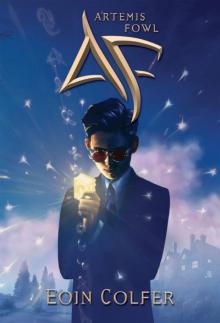 Artemis Fowl
Artemis Fowl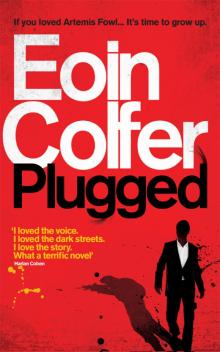 Plugged
Plugged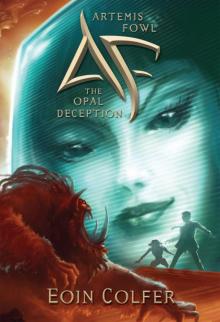 The Opal Deception
The Opal Deception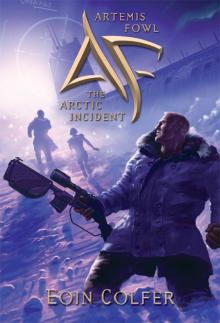 The Arctic Incident
The Arctic Incident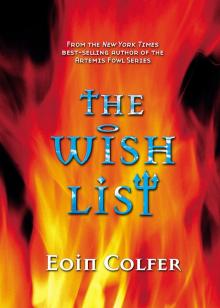 The Wish List
The Wish List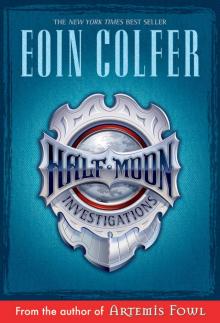 Novel - Half Moon Investigations
Novel - Half Moon Investigations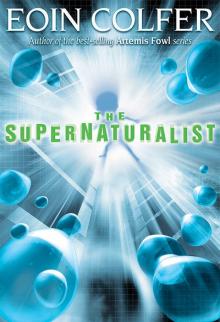 The Supernaturalist
The Supernaturalist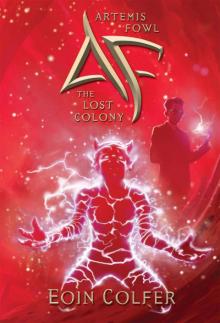 The Lost Colony
The Lost Colony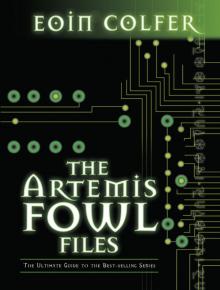 The Artemis Fowl Files
The Artemis Fowl Files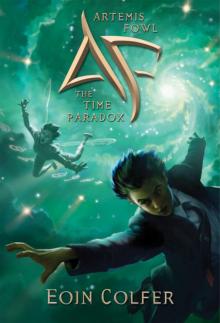 The Time Paradox
The Time Paradox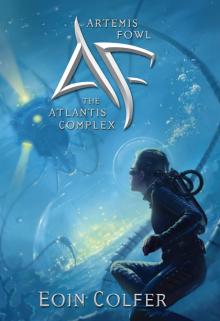 The Atlantis Complex
The Atlantis Complex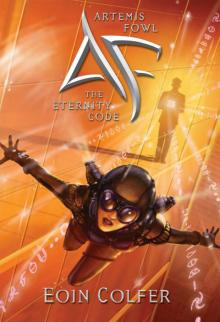 The Eternity Code
The Eternity Code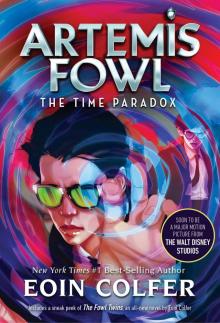 The Time Paradox (Disney)
The Time Paradox (Disney)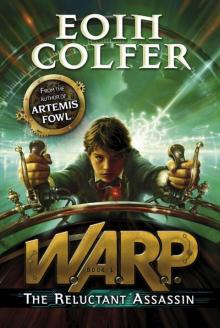 The Reluctant Assassin
The Reluctant Assassin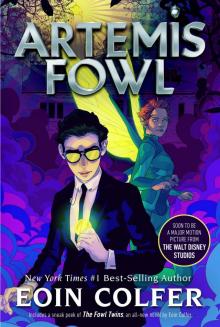 Artemis Fowl (Disney)
Artemis Fowl (Disney)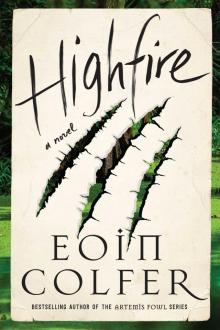 Highfire
Highfire The Last Guardian
The Last Guardian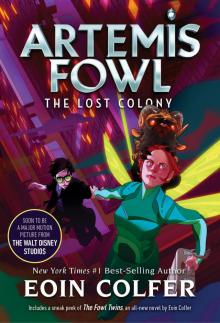 The Lost Colony (Disney)
The Lost Colony (Disney)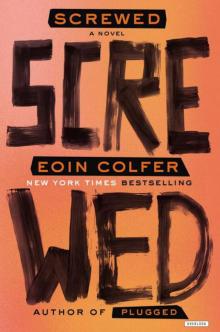 Screwed: A Novel
Screwed: A Novel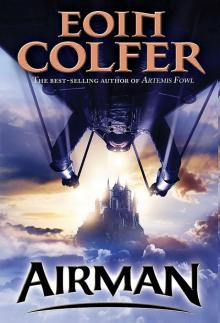 Novel - Airman
Novel - Airman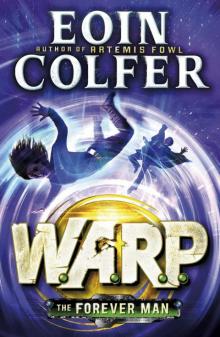 The Forever Man
The Forever Man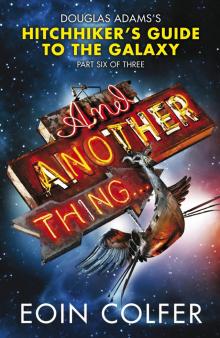 And Another Thing...
And Another Thing...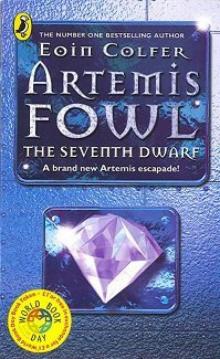 The Seventh Dwarf
The Seventh Dwarf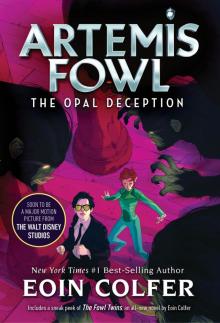 The Opal Deception (Disney)
The Opal Deception (Disney)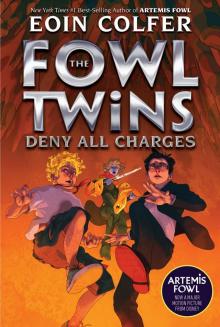 The Fowl Twins Deny All Charges
The Fowl Twins Deny All Charges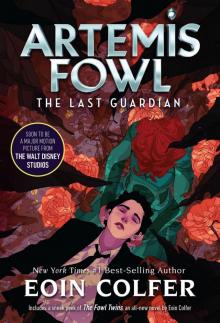 The Last Guardian (Disney)
The Last Guardian (Disney)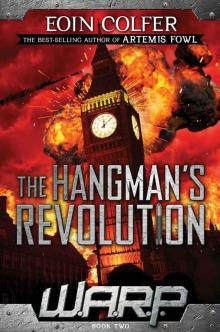 The Hangman's Revolution
The Hangman's Revolution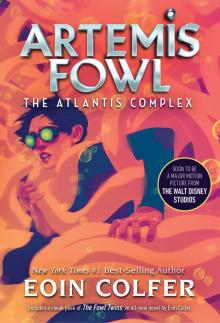 The Atlantis Complex (Disney)
The Atlantis Complex (Disney)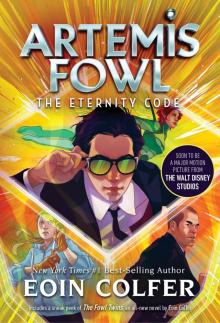 The Eternity Code (Disney)
The Eternity Code (Disney)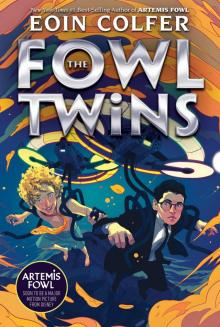 The Fowl Twins
The Fowl Twins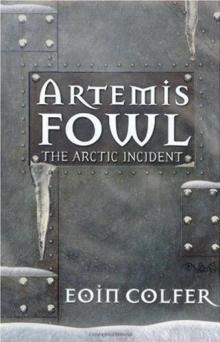 Artemis Fowl. The Arctic Incident af-2
Artemis Fowl. The Arctic Incident af-2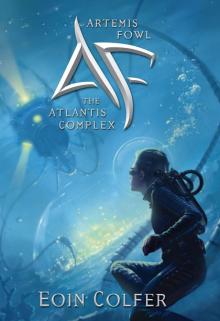 Artemis Fowl and the Atlantis Complex af-7
Artemis Fowl and the Atlantis Complex af-7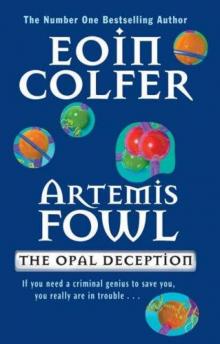 Artemis Fowl. The Opal Deception af-4
Artemis Fowl. The Opal Deception af-4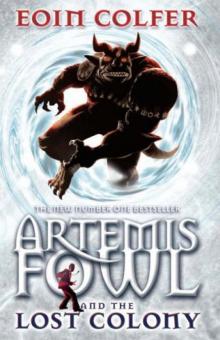 Artemis Fowl. The Lost Colony af-5
Artemis Fowl. The Lost Colony af-5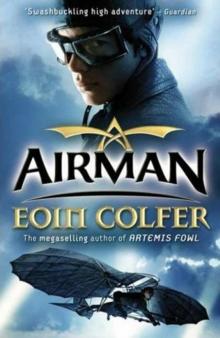 Airman
Airman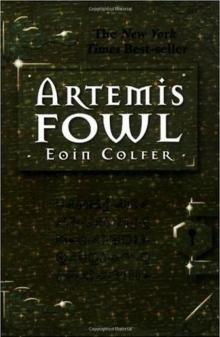 Artemis Fowl af-1
Artemis Fowl af-1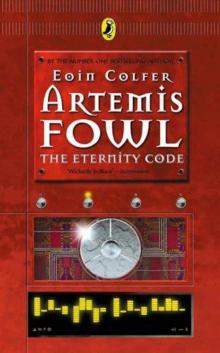 Artemis Fowl: The Eternity Code af-3
Artemis Fowl: The Eternity Code af-3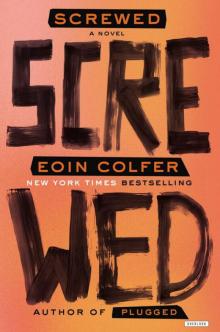 Screwed dm-2
Screwed dm-2